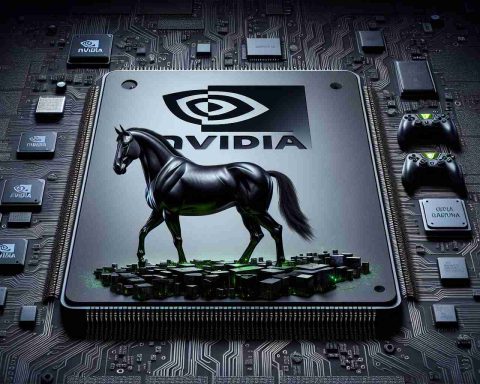Nvidia, a major player in the world of artificial intelligence and semiconductor technology, recently faced a setback as its stock price tumbled 17% from its peak in November. With the stock nearing bear market territory—defined as a 20% drop from a recent high—the concerns stem from evolving narratives around AI demand.
At the heart of this issue are recent insights from Microsoft CEO Satya Nadella. In a podcast interview, Nadella indicated that the intense demand for AI chips, which Nvidia has thrived on, might be easing. He remarked that Microsoft is no longer constrained by chip supply, hinting that the situation is shifting. This observation signals a potential change in Nvidia’s stronghold over the AI chip market, causing a shake among investors.
Nvidia, known for its dominance in producing GPUs crucial for AI development, has had to be selective in its clients due to overwhelming demand over the past couple of years. However, Nadella’s hints at a balanced supply could suggest that companies like Nvidia need to adjust their market strategies.
Despite short-term pressures, analysts like Dan Ives remain optimistic about Nvidia’s long-term trajectory, driven by its future AI innovations. Moreover, the anticipation around Nvidia’s next-generation Blackwell GPU, which faces a reported backlog, underscores continued interest in their products.
As the AI landscape evolves, Nvidia’s prospects might hinge on its ability to adapt to these market fluctuations and maintain its leadership amidst emerging challenges.
Nvidia’s Strategic Shift: Navigating AI Demand and Market Dynamics
Nvidia, a powerhouse in artificial intelligence (AI) and semiconductor technology, is at a pivotal juncture as it confronts market fluctuations and shifting demand dynamics. Recent developments have nuanced Nvidia’s market position, providing valuable insights into the evolving tech landscape.
Market Analysis and Trends
Nvidia’s recent stock dip, a 17% drop from its peak in November, has raised questions about the future demand for AI chips. As Microsoft CEO Satya Nadella noted, the intense demand for these chips is potentially stabilising, signalling a shift in market pressures. This evolution reflects broader trends in AI adoption and the balance of chip supply and demand, influencing investor confidence and market predictions.
Innovations and Future Prospects
Despite the immediate market concerns, experts like Dan Ives underscore the long-term potential for Nvidia. Anticipation around the next-generation Blackwell GPU highlights the ongoing interest in Nvidia’s innovations, suggesting that while short-term challenges exist, the company’s foundational technology remains strong. As the industry braces for further advancements, Nvidia’s role in shaping AI’s future cannot be overstated.
Strategic Adjustments in the AI Chip Market
Nvidia’s strategic approach will be crucial in navigating the AI sector’s complexities. With mentions of a balanced chip supply by Nadella, Nvidia might need to reconsider its client engagement strategies. Ensuring that they remain competitive will involve adapting to both increased supply from competitors and potential shifts in demand.
Security Aspects and Compliance
In the realm of AI technology, security and compliance are turning points for future tech development strategies. Nvidia’s GPUs must adhere to rigorous standards to protect data and ensure privacy, further influencing their application across industries. The tech giant’s ability to innovate while ensuring security will be integral to maintaining consumer trust and market relevance.
Conclusion: Nvidia’s Path Forward
Nvidia stands at a crossroads with opportunities to redefine its market strategies amidst changing tides. As demand stabilises and competitors adjust, Nvidia’s adaptation will be critical. With keen insights, Nvidia remains poised to harness ever-evolving AI ecosystems, potentially leading the next wave of technological breakthroughs.
By scrutinising the current market environment and maintaining a forward-thinking approach to innovation and security, Nvidia can continue to be a dominant force in semiconductor technology.


















